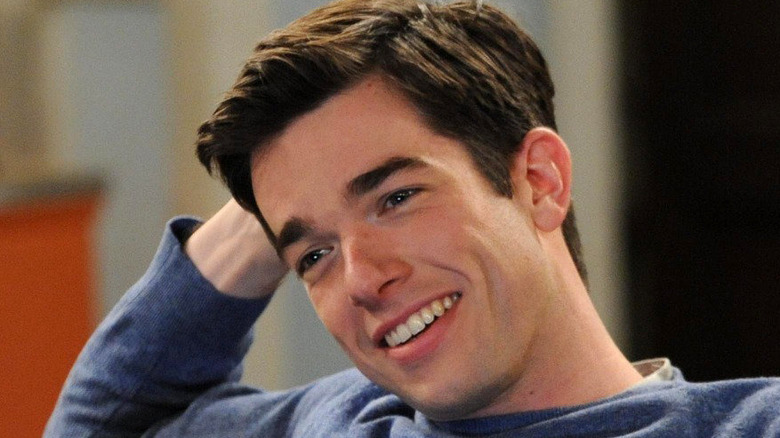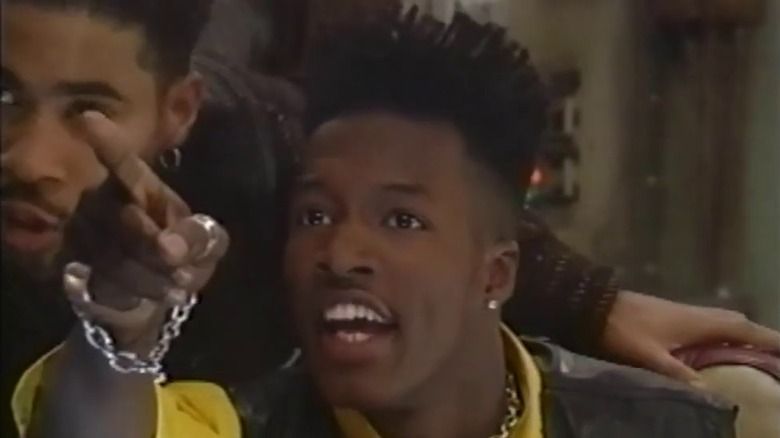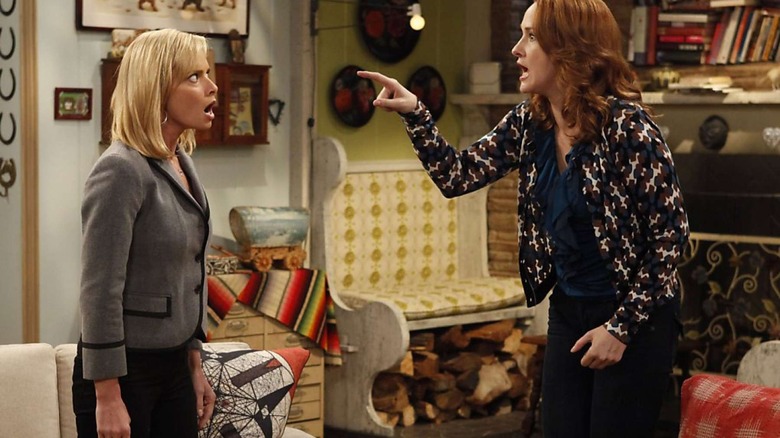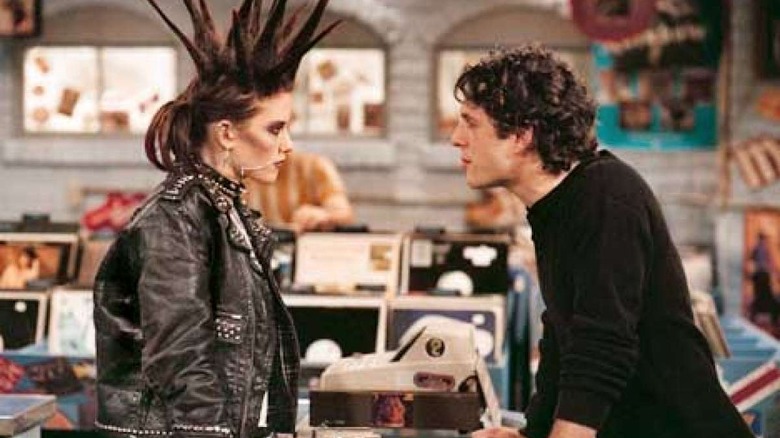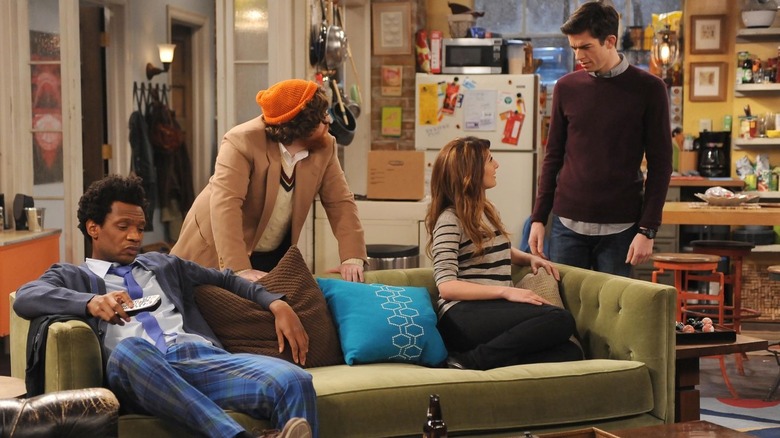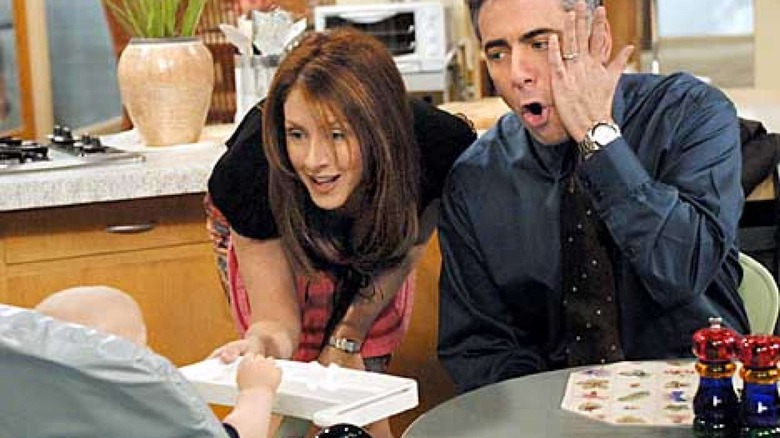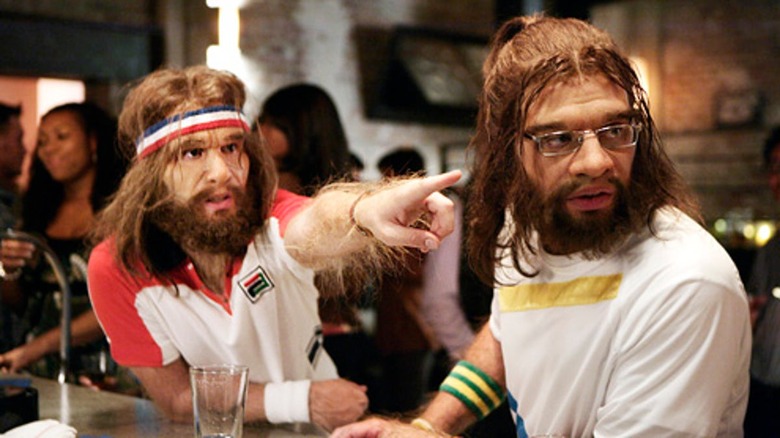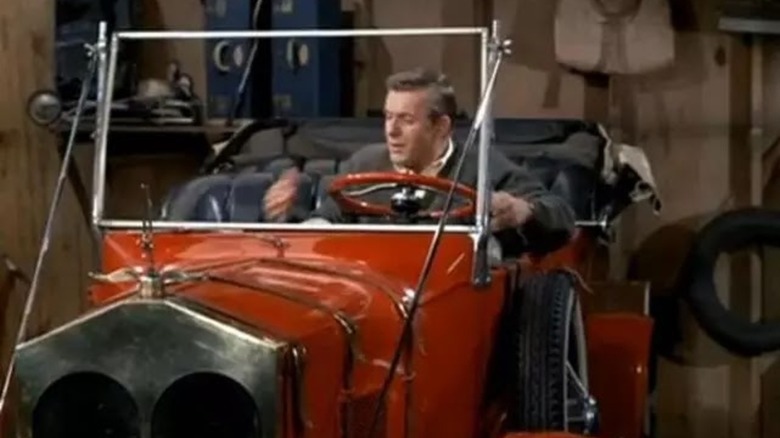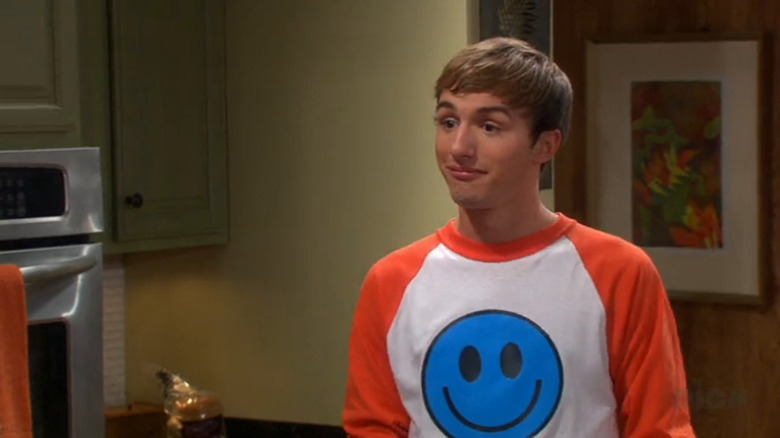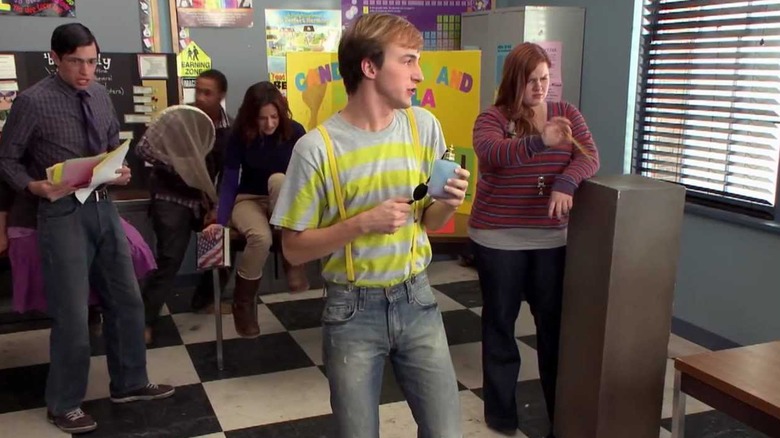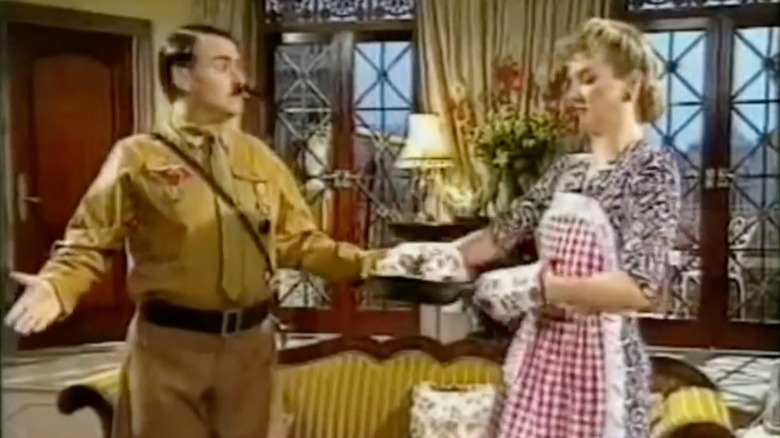The Worst Sitcoms Ever Made
Sitcoms are rarely praised the way that prestige TV dramas are, but the best of the genre rank as some of the greatest shows ever made. "I Love Lucy." "All In The Family." "My Three Sons." "Cheers." "Seinfeld." "Arrested Development." "Fleabag." The list goes on. When shows like this play their cards just right, they can make us laugh, cry, and put off watching new programs in favor of yet another rewatch of "The Office."
But like any art form, if it can be done well, it can also be done poorly. And for every "Friends," "Scrubs," or "The Honeymooners," there are plenty of lousy sitcoms that are insensitive, dated, boring, weird, or just plain unfunny. Some check several of those unfortunate boxes. Most have been rightfully forgotten. A handful live on in TV infamy: a rancid, unremovable stain on the filmographies of everyone involved.
So which sitcoms should you avoid at all costs? Which ones are so incompetent that they go full circle and become fascinating? Well pull up a chair and get ready to ... not laugh. Whether they fail at the situation, the comedy, or both, these are the worst sitcoms ever made.
Homeboys in Outer Space
"Homeboys in Outer Space" followed two Black astronauts who flew around the Milky Way in their dumpy flying car, the Space Hoopty, sometime in the 23rd century. We're already off to a questionable start, but plenty of shows have succeeded with dumb premises, so we won't write it off just yet. Unfortunately, the premise is hardly what turned audiences against this rancid, short-lived, 1996-1997 UPN sitcom. The main problem is that it relies not just on the kind of lowbrow, predictable, hack punchlines you'd expect from any mediocre program, but also on racist stereotypes about Black Americans, and the idea that if you shout something and add a laugh track, it automatically makes it funny.
"Homeboys" fails in both its toothless writing and the assumption that simply referencing the Wu-Tang Clan is a good enough substitute for an actual joke. The show does have energy, though, even if it's light on laughs. Flex (who plays Tyberius Walker) and Darrel Bell (as Morris Clay) really are trying. That's a lot more than you can say for the writers, directors, set designers, and anyone else responsible for making this show look like a "Star Trek" production run by a local middle school.
I Hate My Teenage Daughter
"I Hate My Teenage Daughter" follows two divorced moms who realize they screwed up as parents: Their entitled, spoiled daughters are turning into exactly the type of girls who terrorized them in high school. It's a ... unique premise. We'll give them that. If they played their cards just right, it might've worked as a commentary on bullying, letting go of the past, and the relationships between moms and their teenage girls who are growing up too quickly. But that's in an ideal world, and striking the right balance with such a concept would've been a high wire act: Stray a little to either side, and you can land in some problematic waters.
As evidenced by the very title of the show, this short-lived Fox sitcom didn't exactly strike gold. The show instantly villainized the young girls to an uncomfortable degree, and pitted their own moms against them. In a better show, this could've been resolved with heartwarming and insightful dialogue. But any opportunity to examine the struggles of parenting high schoolers was squandered with unlikeable, one-note characters and mean-spirited writing. Not even the liberal use of canned laughter could cover up how sad the show really was.
Don't hate your kids, people. Love them enough that they don't turn out like this. And by "this," we mean the type of people who could make a show this bad.
That '80s Show
"That '70s Show" was great. It ran for nine seasons and was a dependable hit with exactly the demographic it was aiming for. You can probably follow the thought process that led to the creation of "That '80s Show," fronted by a young Glenn Howerton, who went on to play Dennis Reynolds in "It's Always Sunny in Philadelphia."
Unfortunately, having a proven formula from one hit show, as well as a star who would go on to future sitcom glory, wasn't enough to salvage this laughless disappointment. For one thing, despite having some of the same writing staff as "That '70s Show," "That '80s Show" was its own animal. None of the characters or storylines cross paths with its much more successful and popular older brother. It might've helped.
The story is about struggling young musicians in 1984 San Diego, and it could've been a fun watch, but it just wasn't as original and witty as it needed to be to avoid negative comparisons to "That '70s Show." Watch even a small snippet of "That '80s Show" and you'll realize it's one of those shows that's frustrating because a far superior version was well within reach, but it never bothers to stretch for it.
Mulaney
On paper, a show about the early career struggles of "SNL" vet John Mulaney, starring himself, should've been a classic. Mulaney is popular and likeable, and the "stand-up comic plays a fictionalized version of himself" formula has worked in the past, with hits like "Seinfeld" and "Louie."
But it was the very success of that formula that undermined "Mulaney." Comparisons to "Seinfeld" were inevitable, but the show did itself no favors by literally copying the beloved '90s staple to a degree that was impossible to ignore. It was a multi-camera series about a struggling young comedian in New York City, and his wacky neighbors and friends. Been there, done that. Everything about the series felt forced, uninspired, and dated. Jerry Seinfeld wasn't much of an actor, but his show was at least filled with hilarious characters and some of the greatest writing in comedy history. "Mulaney," on the other hand, featured a surprisingly bland leading man supported by tropey side characters and predictable punchlines. Critics obliterated the series, and Fox pulled the plug after its first season ended in 2015.
Said Mulaney himself (via the Broward Palm Beach New Times), "I look back on making the show really fondly. It's my noble failure. I tried, and I wanted to do it this way. Some people liked it. Just not enough."
Yeah, that's an understatement. But at least Mulaney remains one of the most talented and successful stand-ups working today, so he's doing just fine.
Baby Bob
What do "Seinfeld," "The Office," "Friends," "Cheers," and "Everybody Loves Raymond" have in common? Their premises aren't funny. Just, "here are people in a place." That's a good thing. A basic setup isn't boring; it's a blank page on which years of relatable, character-driven humor can be written. That's why they all lasted nine seasons or more. But shows with more "wacky" premises often find their humor handcuffed to the central gimmick of the show. If your story is about a talking cat that runs a coffee shop, all the jokes will be a variation of "Hang on, I came in for a latte and now I'm talking to a cat! What!" And that'll get old fast.
This was lost on the creators of "Baby Bob," about a baby that talks like an adult. Go ahead and write down the worst "what if babies could talk?" jokes you can imagine. Got it? We regret to inform you that "Baby Bob" was even lazier than that. The real tragedy here is that the world had already suffered through the "Look Who's Talking" trilogy and the "Baby Geniuses" movies. There was no need to put us all through the same premise a third time, only to reach the same conclusion: Babies talking a few years too early just isn't funny.
Somehow, the show lasted a full season longer than most of the other crap on this list.
Cavemen
You probably remember Geico's Cavemen ads, in which Neanderthals are offended by the tagline "So easy a caveman can do it." That's good enough for a commercial. But if you base an entire sitcom on that joke, like ABC did with 2007's "Cavemen," people will pick up on flaws that a 30-second spot doesn't give them enough time to examine. Namely, that if the only thing that makes the characters cavemen is that they have too much facial hair, there's only so much humor that can be pulled from the premise.
In the series, cavemen never died out and have become assimilated into modern human culture, where they face racism (speciesism?) and other obstacles that minority communities endure in real life. The ambition was to use the show's characters to examine race relations. It's not a terrible idea. If they did it right, or maybe made a drama out of it, it could've been something special.
But this was no "Planet of the Apes." The acting was fine, but the show just wasn't funny. On top of that, many minority groups didn't appreciate being compared to cavemen, literally a lower form of life. Noble intentions aside, "Cavemen" remains a cautionary tale about how not to do satire.
In the end, the show did about as well as it deserved to: It was canceled after one season. Insert joke about going extinct here.
My Mother the Car
Ever notice that sitcom premises were a lot stranger back in the day? Most shows of the last 30 or so years are just a group of friends, coworkers, or family members hanging out in normal settings. In the '60s and '70's, on the other hand, we have all sorts of wild concepts for sitcoms. There's "Mister Ed," about a talking horse, "Bewitched," about a witch in the suburbs, "I Dream of Jeannie," about an obedient genie, and "The Flying Nun," about, well, you can probably figure that one out. But all of those were miles better than "My Mother the Car."
This loathed show was about exactly what its name suggests. An attorney gets a used car that ends up being his reincarnated mother. Let's not waste time trying to reverse engineer the thought process that led to that idea. The real head-scratcher is the fact that the team behind this dud had some bona fide sitcom hits under their belts, including "The Mary Tyler Moore Show" and "Rhoda." Another mystery is how "Knight Rider," featuring David Hasselhoff and a talking, crime-fighting car, was a success, while this show was such a misfire.
You'd think a show with a premise this dumb would at least be over-the-top enough to watch and mock. But it's not. It's remarkably boring. And there's nothing worse than a boring sitcom.
Marvin Marvin
If you've ever heard of Lucas Cruikshank, it's probably because of Fred: a screeching, high-pitched character he developed on YouTube before bringing to Nickelodeon. But this wasn't the only televised crime against humanity Cruikshank unleashed upon the world. After the failure of "Fred: the Show," Cruikshank returned for another short-lived, widely panned series on Nick, titled "Marvin Marvin."
Lucas traded his Fred character for the titular Marvin, who is almost as insufferable. Mercifully, this character, an alien whose parents sent him to earth disguised as a human to avoid the invasion of his home planet Klooton, doesn't stare into the camera and scream like Fred. But the rest of the manic, hyperactive energy that defines Cruikshank characters is there in all its headache-inducing glory.
Terrible writing and acting aside, the premise may be giving you déjà vu. Not only was "Mork and Mindy" already a thing, but Nick had explored this premise twice before, with "Invader Zim" and "The Journey of Allen Strange." Sure, Marvin wasn't secretly scheming to take over the world like Zim, but the whole "alien high schooler pretending to be human" thing is too close for comfort. Now that we're thinking about it, if Zim had just tried being as obnoxious as Marvin, we probably would've surrendered the planet just to get him to shut up.
Fred: The Show
Yes, Lucas Cruikshank managed to get on this list twice. We'd feel bad for the kid if he didn't do everything in his power to annoy the world for years with his insufferable Fred Figglehorn character. If you don't remember Fred, congratulations. Either you were mercifully spared from hearing about him when he was a YouTube sensation, or your brain purged the memories long ago. Sadly, it is our duty to inform you that Fred Figglehorn was very real, not a nightmare, and that he actually got his own movie series and a short-lived TV show on Nickelodeon.
If you have heard of Fred, then that show, "Fred: The Show," is exactly what you'd expect. The titular character, now 16 years old, gets into typical teen sitcom high school hijinks, all while screeching obnoxiously into the camera and generally terrorizing his friends and family. Miraculously, he has both.
We intentionally didn't include many teen sitcoms on this list, since it's not necessarily a bad thing to appeal to a younger audience. But we had to make an exception for this hideous misfire, which is impossible to recommend on any level whatsoever. Mercifully, the show was canceled after a single season due to murderous reviews and a rapidly dwindling audience. Good riddance. Luckily, Cruikshank eventually dropped the Fred character and hosts a much more normal, less annoying YouTube channel.
Heil Honey I'm Home!
Plenty of TV pilots go nowhere. But it's not easy to actually get on the air and then get canceled after one episode. That's exactly what happened with "Heil Honey I'm Home?" So what went wrong here? It's a British Show about a couple in a Berlin flat, constantly being annoyed by their neighbors. It's nothing we haven't seen before, and it doesn't seem too offensive for –
Oh. Oh, no.
As suggested by the name, the protagonist is none other than Adolf Hitler. You know the guy. Tyrannical leader of Nazi Germany? Chief, proud perpetrator of the most infamous genocide in human history? Yeah, him. Not exactly your typical sitcom fodder. Especially one marketed to a nation that was heavily bombed by the guy in real life. Oh, and those annoying neighbors? Jewish. But you probably saw that coming.
In the show's single episode, Hitler and Eva Braun, who are caricatures of their historical selves (just regular, middle-class folks), host British Prime Minister Neville Chamberlain and try to hide the news of his visit from their obnoxious Jewish neighbors, the Goldsteins. This classless show, a spoof of American sitcoms, has surprisingly toothless writing but still manages to catastrophically exceed the limits of satire. It's simply not possible to look past the fact that the protagonist is literally Hitler. Mercifully, the show was yanked after the pilot episode caused an uproar, and the rest of the season was never aired. Yikes.
